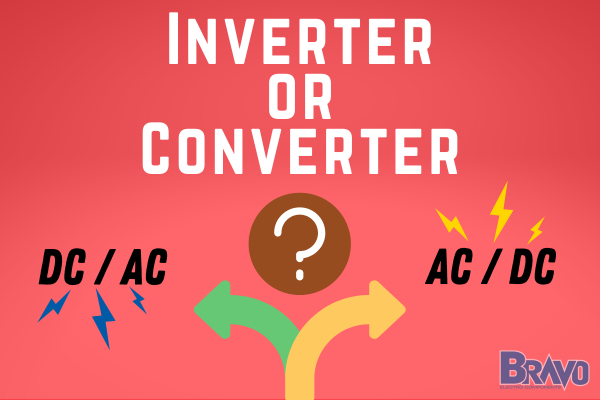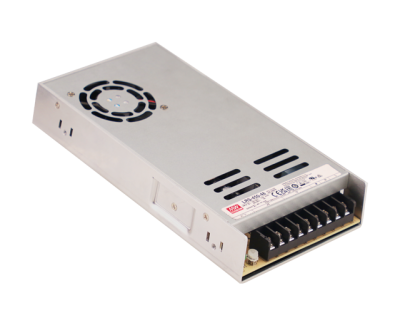
Wondering whether you need an AC to DC inverter or converter? This can be a source of uncertainty, especially when ensuring the efficiency and reliability of your industrial or commercial systems.
The decision hinges on your specific power conversion needs: inverters are typically used for transforming DC to AC and back to DC, often for specialized applications. On the other hand, converters are fundamental in directly converting AC to a usable DC form.
While each has its place in the world of power supply, only one is right for your operation. We’ll clarify these distinctions and help you pinpoint the exact equipment your operation demands.
Trust Bravo Electro to not only guide you through this choice but also provide the high-quality solutions you need. We have the premier selection of AC to DC converters and inverters waiting to be discovered!
What is the Difference Between an AC to DC Inverter or Converter?
Let’s not waste any time - what is the difference between an AC to DC inverter or converter? While they both serve the critical function of power conversion, their roles and operational mechanisms differ significantly.
We’ll highlight where they differ below and walk you through the process of choosing the right equipment for your operation’s unique needs.
What is an AC to DC Inverter?
An AC to DC inverter is a bit of a misnomer, as traditional inverters actually convert DC power (like the kind you'd get from a battery or solar panel) into AC power, which is the standard type of power used in most commercial and industrial settings. In saying that, an AC to DC inverter technically doesn’t exist.
What is an AC to DC Converter?
Now, let’s introduce the other half of the AC-DC inverter or converter conversation. An AC-to-DC converter directly converts alternating current (AC) from the power grid into direct current (DC).
This type of converter is essential in almost all electronic devices that require a steady DC power supply but are connected to standard AC power like that in an electrical outlet.
These converters are crucial in applications ranging from charging batteries to running complex industrial machinery, ensuring that these devices receive a stable, regulated DC voltage.
You can read about the difference between AC and DC in our blog for more context. We also address questions like is house electric AC or DC, or how to convert DC to AC. But below, we’ll start to look at which of these solutions is right for you.
Identifying Your Devices' Power Needs
The first step in determining whether you need an AC-DC inverter or converter is to clearly identify the power requirements of your devices.
This involves understanding the type of current your devices need (AC or DC), the voltage levels they operate at, and their power consumption in watts or amperes.
These power supply specifications are usually detailed in the product documentation or identified on the device itself for industrial equipment.
It's crucial to assess whether your device is designed to run on direct current (DC) supplied by batteries, solar panels, or other DC sources, or if it requires alternating current (AC) like that provided by the main power grid.
The Importance of Voltage and Current Compatibility
Once you've identified your devices' power needs, the next step is to ensure voltage and current compatibility. This means the output of the AC-DC inverter or converter must match the input requirements of your device.
The voltage output of the power supply must closely match the voltage requirement of your device, usually within a 1-2% range. Incorrect voltage can cause inefficiencies or even damage the device. We’ve discussed what happens if your PSU is too weak and what happens if you use a higher voltage power supply in our blog for more information.
Similarly, the power supply should be capable of providing enough current for your device's needs. If your device requires 10 amps, for example, your power supply should be able to deliver at least 10 amps.
A power supply with a higher current rating is acceptable, as the device will only draw the current it needs. However, a power supply with a lower current rating than required won't be sufficient and can lead to problems.
Incorrect voltage or current can result in poor performance, increased wear and tear, and even safety hazards.
So, don’t overlook this decision - as it influences your power supply efficiency, reliability, and power supply lifespan. That being said, do you need an AC-DC inverter or converter?
So, Do I Need an AC to DC Inverter or Converter?
So, what power supply do I need - an AC to DC inverter or converter? It’s actually a fairly simple decision.
If your device operates on DC power and you have an AC power source, you'll need an AC to DC converter. This is common in most industrial and commercial environments where equipment requires a stable DC power supply but is connected to an AC grid.
Whatever power supply types you need, one thing remains true: Bravo Electro has the best selection of AC DC power supply units from the most respected power supply manufacturers in the industry.
More on that later. First, let’s talk about what to look for whether you need an AC-DC inverter or converter.
What to Look for in a Quality AC to DC Inverter or Converter
Selecting the right AC-DC inverter or converter is crucial for the efficiency and reliability of your industrial or commercial operations.
Beyond basic functionality, several key factors define a quality converter or inverter, ensuring they meet the high demands of professional environments.
High Efficiency and Power Factor
A high-efficiency unit converts the maximum possible power from the AC source to DC output, minimizing energy losses in the form of heat. This not only conserves energy but also reduces operational costs.
Alongside efficiency, a high power factor is desirable. This indicates the effectiveness of the device in converting input power to useful output without wasting energy in reactive power.
Devices with high power factor ratings are more effective in utilizing the available power, leading to enhanced overall performance and a lower power supply cost from an operation standpoint.
Rugged and Durable Design With Comprehensive Protection Features
Converters and inverters in harsh environments should have a rugged design, capable of withstanding harsh conditions, including exposure to dust, moisture, and mechanical stress.
A durable exterior housing, coupled with robust internal components, ensures the converter or inverter withstands the rigors of industrial use.
You won’t have to stress about premature power supply failure and costly power supply replacement, or waste your time repairing power supplies.
Comprehensive protection features are also essential. Look for devices with built-in safeguards against over-voltage, over-current, short circuits, and thermal overload.
These features not only prolong the life of the converter or inverter but also ensure the safety of the connected systems and personnel. You can learn all about power supply certifications such as the class 2 power supply or UL listed power supply in our blog.
Scalable and Modular Design
Converters and inverters with a modular design offer the flexibility to scale up or modify the system as your power requirements grow or change.
This feature allows for easy expansion or customization without the need for a complete system overhaul, offering a cost-effective and adaptable power solution.
We have the perfect fully modular power supply here at Bravo Electro no matter what your needs are, and we can even help you create a custom power supply solution.
Advanced Thermal Management
Advanced thermal management speaks to the device’s ability to efficiently dissipate heat generated during the conversion process. This is crucial for maintaining the reliability and longevity of the device, as excessive heat can lead to component stress and failure.
Look for converters and inverters with built-in cooling systems, such as heat sinks or cooling fans, and thermal protection mechanisms like automatic shutdowns in case of overheating.
These features ensure that the device operates within safe temperature ranges, even under high load conditions. You’re investing in peace of mind by ensuring your unit is equipped with these.
Remote Monitoring and Control Capabilities
These capabilities allow for real-time monitoring of the device’s performance and the ability to make adjustments remotely.
This is particularly beneficial for managing power systems spread across multiple locations or in hard-to-access areas. Remote monitoring can alert you to potential issues before they become major problems, enabling proactive maintenance and reducing downtime.
Additionally, remote control capabilities allow for adjustments to be made on the fly, enhancing the flexibility and responsiveness of your power management system.
After-Sales Support and Warranty
The quality of after-sales support and the warranty offered with an AC to DC converter or inverter are indicative of the manufacturer's confidence in their product.
A comprehensive warranty not only protects your investment but also provides peace of mind. Look for products backed by a solid warranty period and clear terms.
Equally important is the level of after-sales support provided. Responsive and knowledgeable support can make a significant difference in the user experience, especially when it comes to technical products like converters and inverters.
This support includes assistance with PSU installation, trouble shooting power supplies, and resolving any issues that may arise during the product’s lifecycle.
While all of this is a lot to keep in mind, there is one place you can count on for all this and more - Bravo Electro.
Whether You Need an AC to DC Inverter or Converter, You Can Count on Bravo Electro!
Bravo Electro is your premier source of power supplies and fans, dedicated to delivering exceptional customer service and the highest quality products.
You can rest assured you’re getting the efficient, reliable, long-lasting AC-DC inverter or converter you need as we source from brands like MEAN WELL, IPD, Delta, and Cincon.
Our rapid shipping times mean you get what you need, when you need it, without delay. Coupled with an award-winning support team ready to assist via phone, email, or web chat, we ensure a seamless experience for our customers.
We have everything from a DC-to-DC converter to din rail power supply, open frame power supply, external power supply, rack mount power supply, and more. You can sort by power supply voltage, too:
We hope this conversation has left you with complete clarity as to whether you need an AC to DC inverter or converter, but if not, please don’t hesitate to reach out.
Our team is available via live chat or phone call to guide you toward the right decision, avoiding the hassle and headaches of improper selection! Shop now or get in touch today.
Closing Thoughts on Choosing Between an AC to DC Inverter or Converter
Choosing the right AC-DC inverter or converter is crucial for the efficiency and reliability of your systems. Understanding your power needs, ensuring voltage and current compatibility, and selecting a device with the right features are key to making an informed decision.
Learn more about the world of power supply in our blog. We have resources like how to use DC power supply, how to make AC to DC converter, power supply topologies, types of power supply connectors, what causes a voltage drop , unregulated vs regulated power supply, linear vs switching power supply, power supply redundancy, isolated vs non isolated power supply, and more.
For a selection of high-quality converters and inverters backed by expert advice and support, visit Bravo Electro. We’re here to help you find the perfect power solution with confidence and clarity!









